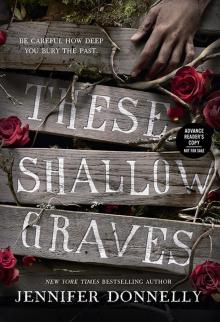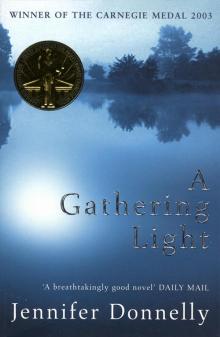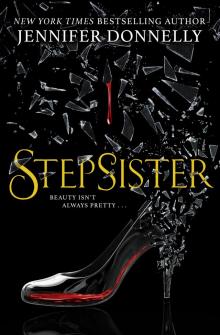- Home
- Jennifer Donnelly
These Shallow Graves Page 6
These Shallow Graves Read online
Page 6
Eddie was right about that, too, Jo realized. Uncle Phillip did pay the authorities to say Papa’s death was accidental.
Phillip reached for her hand. “A woman’s entire happiness depends on her marriage, and I intend for you to make an excellent one.”
Jo nodded, feigning acquiescence. She knew her uncle only wanted the best for her, but she couldn’t do what he was asking—she couldn’t stop trying to find answers, and she couldn’t put her feelings in a neat little box. Her father had taken his life. Something had driven him to it, and that something must have been terrible.
He was gone, but his ghost lingered—in the quiet streets of Gramercy Square, in the hushed rooms of her house, in the hollows of her heart. It would haunt her forever unless she could find out why.
Phillip, still holding her hand, said, “I’ve treated you as an adult, Jo, and now I expect you to behave like one. Your mother has not guessed the truth, and I’m glad of that. Likewise your aunt and cousins. I implore you to carry on bravely and be a comfort to your family, not a source of further distress. Will you do that for me?”
“Of course, Uncle Phillip,” Jo said, forcing a smile.
He gave her hand a quick squeeze. “That’s my good girl,” he said, releasing it.
Jo rose to leave, and Phillip walked her to the foyer. As Harney held her coat, her gaze once again met that of her ancestor. There was a challenge in the admiral’s hard gray eyes.
Fac quod faciendum est. It seemed to Jo as if he’d spoken the words aloud.
“Oh, Jo, I’ve just remembered something,” Phillip said. “I saw Mrs. Aldrich yesterday. She invited Caroline and Robert to Herondale next weekend. Gertrude Van Eyck and Gilbert Grosvenor, too. She wondered if your mother might be persuaded to allow you to join them. Would you like that? If so, I’ll have a word with Anna. It would only be a small, private gathering of close friends—nothing to offend the proprieties—and I think a change of scenery would do you good. The country’s just the thing to rid the mind of morbid thoughts.”
“I would like that very much. Thank you, Uncle,” Jo said. She kissed him goodbye and walked down the stoop to her carriage.
But it wasn’t Herondale she was trying to figure out how to get to as Dolan opened the door for her.
It was 23 Reade Street.
“How does one get inside these things with no bell and no butler?” Jo wondered aloud.
She was standing at the door of a boardinghouse, looking through its glass panes. Gas light from a single sconce flickered in the shabby vestibule, illuminating a rusty radiator and some empty milk bottles. A narrow staircase led to the upper floors.
Jo raised her gloved hand and knocked, but no one answered. As she was about to knock again, a man on the sidewalk behind her bellowed so loudly, she jumped.
“Hey, Tommy! Tommy Barton!” He waited for a few seconds, then cupped his hands around his mouth and yelled. “Barton, you lazy bastard! Open up!”
Above Jo’s head, a window was raised. “Chrissakes, Al, what do you want? I’m asleep!”
“Not anymore. Press is down at the Trib. Chief says get your ass over there on the double!”
Additional profanities were uttered, the window was slammed shut, and Al trotted off. A minute later, a young man—bleary-eyed and tousled—hurtled down the stairs. He flung the door open and barreled past her. Seeing her chance, Jo caught the door before it could close.
“Excuse me, sir!” she called after him. “I’m looking for Edward Gallagher. Could you tell me on which floor I might find his apartment?”
Tommy Barton stopped and turned. He looked her up and down. She was wearing a matching slate-gray jacket and skirt. The suit was from two seasons ago. It was plainly trimmed but cut well. Her hair was in a simple twist, anchored with a jet comb.
“Me, I gotta go all the way over to Della McEvoy’s to get a girl, and no matter which one I pick, she don’t look nothing like you,” Barton said. “Whose house you from, sister?”
What an odd question, Jo thought. “My own, of course. In Gramercy Square,” she replied.
Tommy Barton let out a whistle. “Uptown girl, eh? They must pay ’em well at the Standard.”
Jo blinked at him, puzzled. “I wouldn’t know anything about Mr. Gallagher’s financial arrangements. If you would be so kind …”
“Second floor. Second door on your right. Go easy on him.”
Jo nodded uncertainly. “I shall,” she said. She stepped into the vestibule and looked around. The walls were dingy, the linoleum worn. The sour reek of cabbage wafted through the air. Someone was shouting.
Go home. Now, a voice inside her said. This is insanity.
And it was. She’d taken a dreadful risk. Earlier that day, she’d removed her father’s house key from his desk and a hundred-dollar note from his agenda. Then she’d had her maid, Katie, run to the bank to change the large note into smaller ones. Half an hour ago, at ten p.m., she’d left her home without an escort, to visit a man. She’d had to outwit Theakston to do it. No well-bred girl walked the streets of the city alone after dark. Were she to be found out, her reputation would be ruined.
Jo knew she should listen to the voice. Only two days ago, her uncle had told her how important it was that her conduct be above reproach. As she recalled his dire warnings, she almost lost her nerve.
If I’m seen here, if anyone finds out about this … , she fretted, anxiously eyeing the staircase.
She was just about to leave when she thought of Nellie Bly. Bly had faked insanity to get herself committed to a madhouse so she could write about the terrible treatment its inmates endured. If Bly was brave enough to endure ten days of abuse in pursuit of the truth, then she, Jo Montfort, could walk up a staircase.
Gathering her skirts in one hand, she took hold of the banister with the other. Halfway up the stairs, she heard a door slam above her. Footsteps pounded across the landing, and then a young man came careening toward her. He was wearing twill trousers and a tweed vest and jacket. She immediately recognized the handsome face, the too-long hair, the astonishing blue eyes.
“Mr. Gallagher! I’ve found you!” she said excitedly.
Eddie came to a stop a few steps above her. His eyes widened. “You’ve got to be kidding me. What are you doing here, Miss Montfort?”
“Paying you a call.”
“At ten-thirty on a Monday night? Does your mother know you’re out?”
“I certainly hope not,” Jo said earnestly. “I paid my maid, Katie, a dollar to put on my nightclothes and get into my bed in case my mother checks on me.”
“How clever of you, Miss Montfort.”
“That’s a rather charitable interpretation of my behavior, Mr. Gallagher. I see it as highly deceitful, truth be told, but I could find no other way to speak with you.”
Eddie shook his head. “Can’t talk now. Sorry. Got a lead on a story.”
“Really? How exciting!” Jo exclaimed, thrilled to be in the company of a real reporter following a real lead. She was envious, too. She wished it were her striding along the city streets in pursuit of a story. “May I walk with you? I could tell you the reason for my visit on the way.”
“It’s a free country,” Eddie said with a shrug.
Jo was delighted with this concession. They left the boardinghouse and walked to Broadway. Eddie set a fast pace. She nearly had to trot to keep up with him. As they walked, she told him about her father’s agenda, the mysterious notations inside it, and the strange man she’d seen gazing up at his window. She also told him about the conversation she’d had with her uncle.
“That’s why I came to your home,” she explained. “Because my uncle’s banned me from Park Row.”
“That’s all very interesting, Miss Montfort, but what’s it got to do with me?”
“I need your help,” Jo said. “You’re a reporter. Reporters fi
nd things out. I need to find out why my father took his life. Will you help me? I’ll make it worth your while.”
Just then, Jo stumbled over a jutting cobblestone and nearly fell on her face. Eddie caught her in the nick of time.
“Mr. Gallagher, is it truly necessary to walk so fast?” she asked crossly, embarrassed by her clumsiness, and by the fact that one of Eddie’s hands was on her waist.
“Yes, Miss Montfort, it is,” Eddie said, steadying her. “I got a tip on a story just before you showed up. I need to check it out. I’m not dabbling here. This is my job I’m talking about.”
“I’m not dabbling, either,” Jo said heatedly. “This is my father I’m talking about. I’ve risked a great deal to come to you tonight. A very great deal.”
Eddie removed his hand from her waist and offered her his arm. Jo took it. She had no choice. Cobblestones, ruts, and trolley tracks made a diabolical obstacle course.
When they reached the sidewalk, Eddie stopped. He didn’t take his arm away. Jo didn’t remove her hand. “You’ll risk more if you pursue this,” he said, his tone softening. “A lot more. Like I told you, suicide’s an ugly thing.”
“I’m prepared for all eventualities, Mr. Gallagher,” Jo said.
“Are you?” Eddie asked, looking at her as if taking her measure. “All right, then, Miss Montfort, here’s the deal: A man went missing two days ago. His body was found tonight behind a Cherry Street warehouse. Turns out his wife left him for someone else. She wanted a divorce, but he wouldn’t give her one. Now the dead man’s parents are accusing the wife’s boyfriend of murdering their son. The boyfriend’s been arrested. The dead man’s at Bellevue.”
He gave her a challenging smile. Jo swallowed. Her hand tightened on his arm.
“B-Bellevue?” she stammered. “As in—”
“As in the morgue. That’s where I’m going. Still want to come?”
“If it isn’t Eddie G.! Guess you got my message. Good thing, because I’m starving. Where are you taking me?” asked the young man in the black leather apron.
He was round-faced, bespectacled, and covered in blood. As Jo watched crimson drops fall from the hem of his apron to the floor, she felt a surge of nausea. For the first time in her life, she blessed her upbringing, with its tight corseting of the emotions. It helped her keep her feelings in check and her supper in her stomach.
“It’s almost eleven, Osk. Most places are closing down,” Eddie said. “I’ll take you out tomorrow.”
“Better be somewhere good,” Oscar said. “You owe me. Guys from the Herald and the World came by. I sent them packing.”
“How’s Moretti’s sound?”
“Ate there last night.”
“Donlon’s?”
“I’m sick of oysters.”
“Mook’s?”
“Monsieur Mouquin’s! Now you’re talking.” Oscar held up a bloodied finger. “But only if they’re serving bouillabaisse.”
Dear God, Jo thought. We’re in a morgue. How can they talk about food?
“Who’s that?” Eddie asked, pointing at a mangled body splayed out on a white ceramic table. Jo didn’t look at it. She knew she’d run out of the place screaming if she did.
“A John Doe. Carriage accident. Cops just brought him in. Who’s that?” the aproned man asked, pointing at Jo.
“Oh, her?” Eddie said. “That’s … that’s our new cub. Josephine …”
“Jones. Josie Jones,” Jo quickly interjected, grateful for Eddie’s fib. She could not let it become known that Miss Josephine Montfort of Gramercy Square frequented the morgue in her spare time. “Very pleased to meet you, Mr. …”
“Oscar. Oscar Rubin. A girl cub? Guess every paper wants its own Nellie Bly now.” He extended a hand. It was covered with gore. Jo stared at it, horrified. “Oh, sorry,” he said.
He wiped the gore off—most of it—then held it out again. Jo had no choice but to take it. Eddie was watching her, waiting for her to crumple. She knew he was testing her—and that she’d better not fail if she wanted his help.
“The morgue?” she’d repeated, when he told her where he was going.
“Yes, the morgue. You game?”
“Yes, Mr. Gallagher, I am,” she’d replied, bluffing madly. “In fact, there is no one more game than I.”
When they’d reached Bellevue Hospital, her hands had started to shake. By the time they’d walked into the morgue, her legs were trembling.
The room was cavernous and cold. Long white ceramic tables stood in rows. Bodies lay upon them—four men, two women, a little boy. The tables had channels in them to catch blood and other bodily fluids, as well as the water that dripped continuously upon the corpses from sprinkler heads suspended from the ceiling. Saws, drills, scissors, and forceps, laid out in a neat rows, rested on an empty table. The smell was unspeakable—a mixture of rotting flesh, the rusty tang of blood, and the tarry bite of carbolic soap.
The cold and damp went right through Jo, but the worst thing about the place was its sadness. The people here hadn’t died where they should have—at home, surrounded by their loved ones. They’d died violently in the street like John Doe, or behind a warehouse, forsaken and alone.
“I suppose you want to see him?” Oscar asked now.
“Dying to,” Eddie said.
Oscar rolled his eyes. “Hope Mook’s bouillabaisse is fresher than your jokes.”
Eddie and Oscar had an almost jovial way around the dead. The bodies, the blood—none of it seemed to bother them.
“He’s over here,” Oscar said, leading Eddie to a table by the far wall. Jo followed.
A man lay upon it. He was slight, with thinning hair and a wispy mustache. A white sheet covered him from his waist down. He had a shrunken look. His chest was narrow, pale, and hairless. Jo had never seen a man’s naked chest before. A faint odor of garlic hung over him. Dried saliva coated his lips and chin. His hands had a blue tinge. His eyes were open.
“Meet Oliver Little,” Oscar said.
It was too much. The poor man’s chest, so bare and vulnerable. His sad, empty eyes. The sound of dripping water. The smell. Jo felt faint. She clenched her hands, driving her nails into her palms. The pain brought her back.
“Why the water, Mr. Rubin?” she asked, desperate to look away. To look at Oscar. Or Eddie. Anywhere but at Oliver Little.
“It’s cold. Helps delay decomposition,” Oscar said.
“So did the boyfriend do it?” Eddie asked.
“That’s what the cops thought. But they were wrong. As usual,” Oscar said.
“What happened?”
“Oliver Little killed himself with an arsenic-based rat poison.”
“How do you know that, Mr. Rubin?” Jo asked, anxious to talk, to think, to do anything but feel.
“It’s Oscar. And I know because of forensic medicine.”
“Forensic medicine?” Jo echoed. The words were new to her.
“The science of death.”
“Oscar’s a medical student,” Eddie explained. “He works nights at the morgue. Days, too, when he doesn’t have class. He’s putting himself through school. I don’t know why. He’s smarter than most of the doctors in this town and all of the cops.”
“How does one practice forensic medicine?” Jo asked, her curiosity overcoming her revulsion.
“Through rigorous observation, my dear,” Oscar said in a professorial voice. “One notes the position of the victim’s body, as well as its stiffness, color, and state of decay. One looks for blood spatter. Determines the absence or presence of powder burns. Differentiates between the cuts of a hatchet and those of a carving knife. Recognizes the chemical actions and reactions of poisons, acids, and solvents. And”—he smiled sheepishly—“goes through the stiff’s pockets.” He held up six empty packets of rat poison and a flat brown whiskey bottle. “I posit
that Little drank some whiskey for courage, dumped the poison into what remained, then downed it..”
“Could the wife or boyfriend have poisoned him and then planted the evidence in his pockets?” Eddie asked. “Arsenic is tasteless, isn’t it? Maybe one of them slipped it into Little’s whiskey without his knowing.”
Oscar shook his head. “Arsenic’s only tasteless in small doses. Six packets of rat poison in a fifth of whiskey counts as an acute dose, and in acute doses, you get a bitter, metallic taste. One slug and Little would’ve known something wasn’t kosher. At that point, the poisoner would have had to force the whiskey down him and the struggle would have left signs—cuts or abrasions around his mouth at the very least. In addition, the symptoms he does display—the dehydration, the blue hands and feet, the hypersalivation and the garlic odor—are all consistent with acute arsenic poisoning. And I’m sure when I cut him open, I’ll find lesions in the stomach and intestines, and clots in the heart. Arsenic leaves tracks.”
“The wife and boyfriend—” Eddie cut in.
“—have alibis,” Oscar finished. “Cop I know told me they were seen together in a restaurant from half past five until seven o’clock, and then at a theater. A shopkeeper remembers selling Mr. Little the poison around six o’clock, and a bartender sold him the whiskey a few minutes later. His body was found just after eight, and the show the wife and boyfriend attended let out at nine.”
“How remarkable,” Jo marveled. “You’ve solved the case!”
“Well done, Holmes,” Eddie said.
“It was elementary, Watson,” Oscar said. “The boyfriend goes free, he gets Oliver Little’s wife, and Oliver gets a pine box. The real killer here? A broken heart.”
Oscar moved off to tend to another body. Eddie followed him, asking more questions about Oliver Little and jotting down the answers on a notepad.
As they walked away, Jo pulled Mr. Little’s sheet up around his neck. How dreadful, she thought, to be naked and dead and have strangers stare at you. Had her father been laid out here? She imagined him in this place, set out on a slab like a cut of meat, and her composure suddenly broke.

 Rogue Wave
Rogue Wave Waterfire Saga, Book One: Deep Blue (A Waterfire Saga Novel)
Waterfire Saga, Book One: Deep Blue (A Waterfire Saga Novel) Revolution
Revolution The Wild Rose
The Wild Rose Waterfire Saga (4 Book Series)
Waterfire Saga (4 Book Series) These Shallow Graves
These Shallow Graves Beauty and the Beast: Lost in a Book
Beauty and the Beast: Lost in a Book A Northern Light
A Northern Light The Tea Rose
The Tea Rose Waterfire Saga, Book Three: Dark Tide: A Deep Blue Novel
Waterfire Saga, Book Three: Dark Tide: A Deep Blue Novel The Winter Rose
The Winter Rose A Gathering Light
A Gathering Light Stepsister
Stepsister Waterfire Saga, Book Four: Sea Spell: Deep Blue Novel, A
Waterfire Saga, Book Four: Sea Spell: Deep Blue Novel, A Northern Light
Northern Light Winter Rose, The
Winter Rose, The